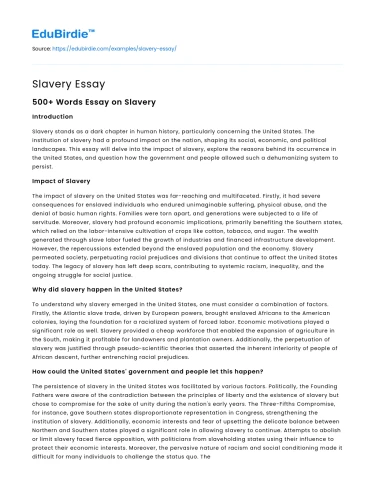500+ Words Essay on Slavery
Introduction
Slavery stands as a dark chapter in human history, particularly concerning the United States. The institution of slavery had a profound impact on the nation, shaping its social, economic, and political landscapes. This essay will delve into the impact of slavery, explore the reasons behind its occurrence in the United States, and question how the government and people allowed such a dehumanizing system to persist.
Impact of Slavery
The impact of slavery on the United States was far-reaching and multifaceted. Firstly, it had severe consequences for enslaved individuals who endured unimaginable suffering, physical abuse, and the denial of basic human rights. Families were torn apart, and generations were subjected to a life of servitude. Moreover, slavery had profound economic implications, primarily benefiting the Southern states, which relied on the labor-intensive cultivation of crops like cotton, tobacco, and sugar. The wealth generated through slave labor fueled the growth of industries and financed infrastructure development.
Save your time!
We can take care of your essay
- Proper editing and formatting
- Free revision, title page, and bibliography
- Flexible prices and money-back guarantee
However, the repercussions extended beyond the enslaved population and the economy. Slavery permeated society, perpetuating racial prejudices and divisions that continue to affect the United States today. The legacy of slavery has left deep scars, contributing to systemic racism, inequality, and the ongoing struggle for social justice.
Why did slavery happen in the United States?
To understand why slavery emerged in the United States, one must consider a combination of factors. Firstly, the Atlantic slave trade, driven by European powers, brought enslaved Africans to the American colonies, laying the foundation for a racialized system of forced labor.
Economic motivations played a significant role as well. Slavery provided a cheap workforce that enabled the expansion of agriculture in the South, making it profitable for landowners and plantation owners. Additionally, the perpetuation of slavery was justified through pseudo-scientific theories that asserted the inherent inferiority of people of African descent, further entrenching racial prejudices.
How could the United States' government and people let this happen?
The persistence of slavery in the United States was facilitated by various factors. Politically, the Founding Fathers were aware of the contradiction between the principles of liberty and the existence of slavery but chose to compromise for the sake of unity during the nation's early years. The Three-Fifths Compromise, for instance, gave Southern states disproportionate representation in Congress, strengthening the institution of slavery.
Additionally, economic interests and fear of upsetting the delicate balance between Northern and Southern states played a significant role in allowing slavery to continue. Attempts to abolish or limit slavery faced fierce opposition, with politicians from slaveholding states using their influence to protect their economic interests.
Moreover, the pervasive nature of racism and social conditioning made it difficult for many individuals to challenge the status quo. The belief in white superiority and the dehumanization of enslaved individuals permeated society, perpetuating the system of slavery.
Conclusion
The institution of slavery in the United States had a profound impact on the nation's history and continues to shape its present reality. It left a lasting legacy of racial inequality and social divisions, the consequences of which persist to this day. The economic motivations, political compromises, and deeply rooted racism within society all contributed to the perpetuation of slavery.
It is crucial to confront this dark chapter in American history honestly and acknowledge its enduring effects. By understanding the causes and consequences of slavery, society can strive towards a more inclusive and equitable future, where the legacy of slavery is comprehensively addressed and rectified.






 Stuck on your essay?
Stuck on your essay?

